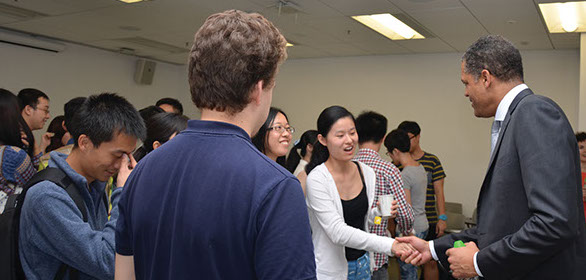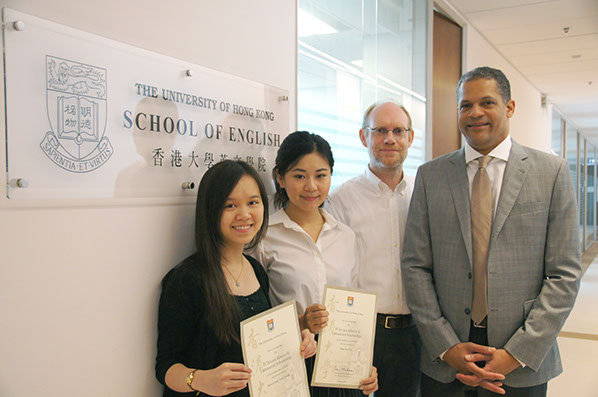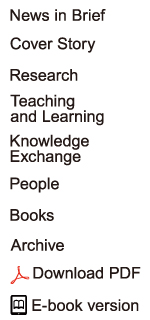Looking at the bigger picture

With a scholarly background in the Classics, particularly archaic Greek poetry, Latin literature, history and magic, and leisure-time passions for fast cars and all kinds of music, the new Dean of Arts Professor Derek Collins hopes to instill in students a love of pursuing a wide range of interests.

![]() Ten, 20, 30 years out of university, Arts graduates are still thinking, still innovating, still flexible in the way they think.
Ten, 20, 30 years out of university, Arts graduates are still thinking, still innovating, still flexible in the way they think. ![]()
Professor Derek Collins
Describing himself as ‘a classicist by training and a Dean by experience’, Professor Collins comes to HKU from the University of Michigan, where he joined the Classics Department 16 years ago and rose to become Dean of Humanities. Several factors drew him to HKU, chiefly its reputation, its students and the calibre of its staff.
“The University has an excellent reputation overseas: particularly for its strength as an academic institution and its regional importance,” said Professor Collins. “The calibre of the staff is incredible and the international breadth is impressive. It’s more genuinely cosmopolitan than I had realised.”
But the biggest impression was made by the students: “I think the students here are stronger than they even know. They function well in three languages, they are intrinsically international and that goes for within the region and beyond. There is a crisis coming in US education – we’re not able to dramatically increase global experiences. But there is a huge gravitational shift to Asia, and HKU already has exposure both to China and the West.”
His vision for the Arts Faculty includes extending that international reach even further: “We already offer languages training and I’d like to enhance our offerings in Arabic, and to extend collaborations to Africa, Middle East, Europe and South America. Building on what is already being done, we can make our students globally unmatched and as competitive as possible.”
He feels strongly that an Arts background is the best possible preparation for life, both in terms of career choices and contentment. “Ten, 20, 30 years out of university, Arts graduates are still thinking, still innovating, still flexible in the way they think. Arts graduates can develop careers in every field – they are not closed off from any areas. They run everything from banks to arts festivals.
“I’m told that some parents feel an Arts graduate won’t earn as much as, say a lawyer. In the United States, figures show that often Arts students make more money in the long run.” The Dean believes though that knowing how to enjoy life is more critical than money, and Arts instills in students a reflective and critical thinking approach to issues that will open many and diverse doors.
“In the United States Liberal Arts students are cocooned for four years, then the approach is that hopefully they will somehow work out how their philosophy degree will help them find a job in, say, the business sector. My outlook is to show students how Arts enhances and broadens their thinking from day one of their degree, and how it can take them to any career.”
He would like to instill a strong sense of leadership and entrepreneurship: “We need to get students to think about how they can create and add value by fostering a focus on leadership. How to actively engage and collaborate with people, how to set objectives and how not to fear failure but to learn from it.“
Collaboration is another key focus. “I’d like to generate more opportunities by creating co-projects across disciplines and encouraging soft entrepreneurship. HKU’s Common Core is a great way to achieve this: forcing students out of their comfort zone is really healthy. One of my goals as Dean of Arts is to continue to nurture that spirit of crossdisciplinary exposure.”

Professor Collins (right) meeting with students at the Faculty Welcoming Reception for Research Postgraduates.
The University’s role
Professor Collins believes too that a university has a fundamental responsibility to the community. “Knowledge Exchange is important because that is what a university – particularly a public
university – should do. We are meant to serve the community. The autonomy a university has should allow it to fulfil these roles,” he said.
“A university really is the only place where a society can step away from the current flow of events and think more broadly about what we are doing and why. But if we’re not then taking those thoughts and communicating them more widely to the public then we’re not meeting our responsibilities to society. It’s crucial to serve the public interest because that’s how society as a whole benefits from the knowledge generated at a university. Our job is to create new knowledge and to create collaborations and possibilities and to think the unimaginable.
“It’s a Confucian philosophical value – to share knowledge with society. What do people need culturally and philosophically? In Classics, the scholar and the philosopher are not separate – and this is at the core of Arts. It’s also a life lesson. It’s not just about your job – and it’s certainly not about how much money you’re going to make – what matters in the end is what kind of contributor to society you are.”
Professor Collins’ own interests as a student at University of California, Los Angeles (UCLA) and Harvard were literature and anthropology, particularly learning how ancient cultures functioned. From there he delved into folklore and also became fascinated by magic. “Magic features throughout history and cultures,” he said. “In Rome for example, they were very concerned about magic, as it might serve to stir up the public imagination – they didn’t want that. At the Faculty of Arts my concern is the opposite: we want to lift the limitations on imagination.”

Dr Dirk Noël (second from right), Head of School of English and Professor Derek Collins (first from right),
Dean of Arts presenting the scholarship certificates to the awardees of the Fr Alvaro Ribeiro SJ Memorial Scholarship.
Back

